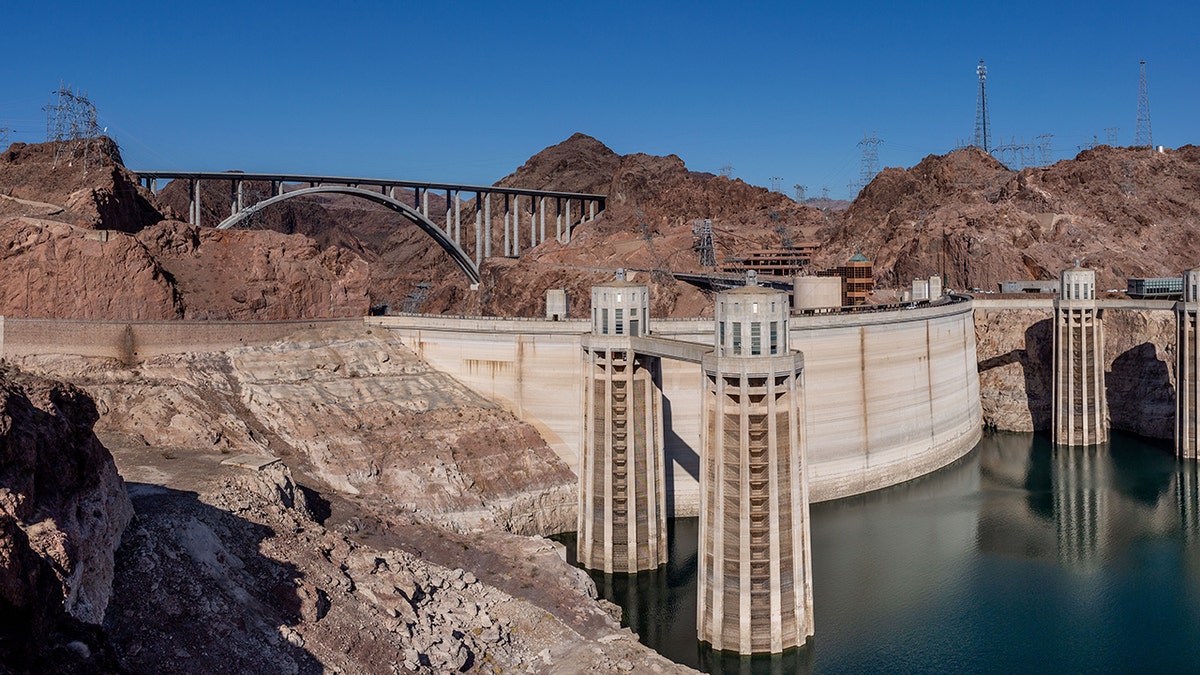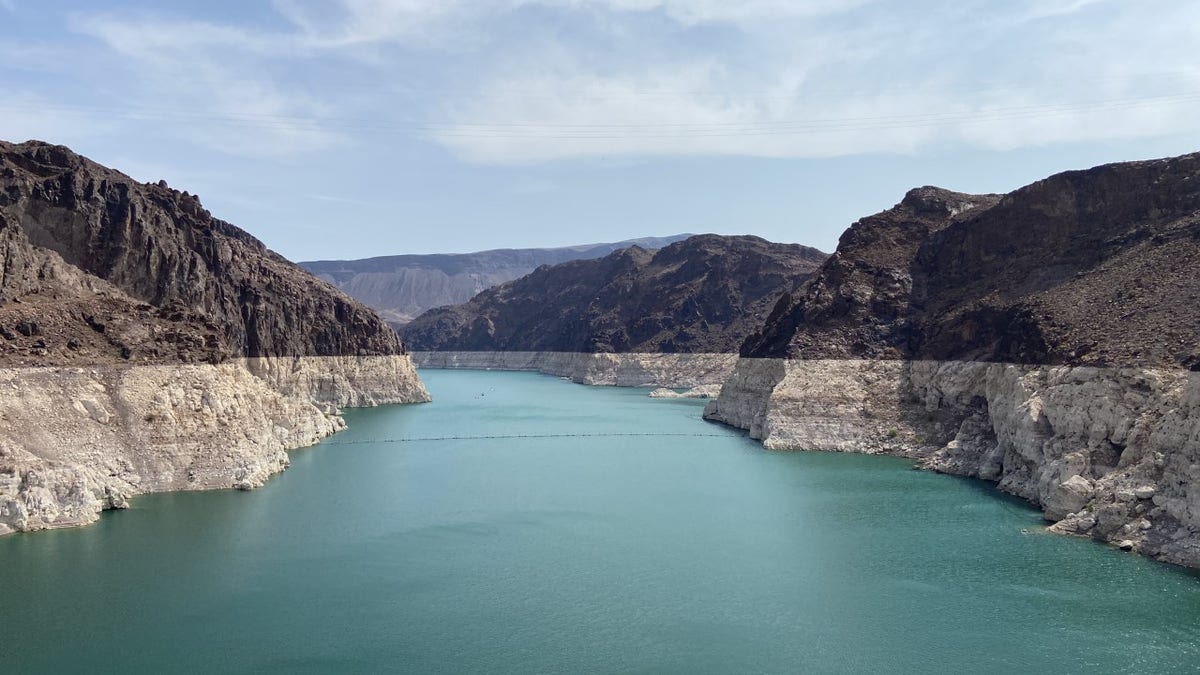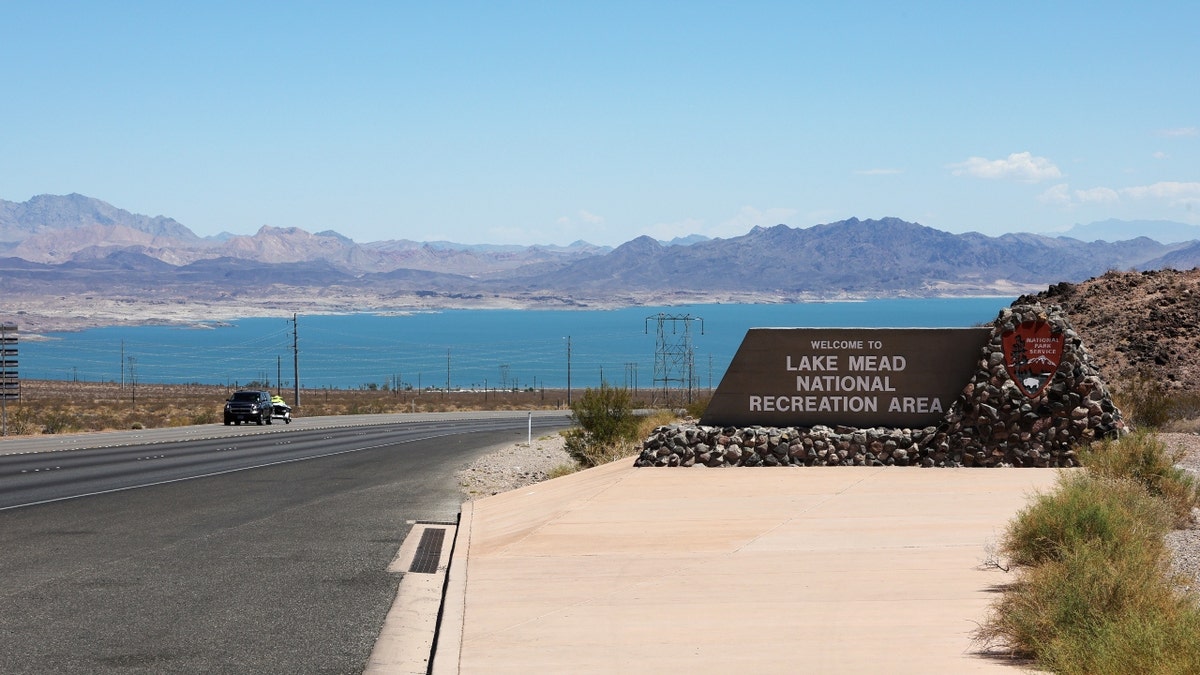Lake Mead, Hoover Dam face historically low water level
Lake Mead's elevation hasn't been this low since 1937.
On this day in history, July 7, 1930, construction of the Hoover Dam began.
Over the course of the next five years, more than 21,000 men would work tirelessly to produce what would become the largest dam of its time and one of the largest manmade structures in the world, according to History.com.
Ninety-six workers died during the construction of the dam from 1931 to 1936, according to a report from the U.S. Bureau of Reclamation.
ON THIS DAY IN HISTORY, JULY 6, 1994, ‘FORREST GUMP’ IS RELEASED IN THEATERS: ‘ONE-OF-A-KIND TREAT’
Also, more than 100 additional dam workers died off while they were off the job; those causes included pneumonia, meningitis and typhoid fever, the same source noted.
The dam is located about 30 miles southeast of Las Vegas, where the Colorado River forms the boundary between Nevada and Arizona.
The 3.25 million cubic yard dam, covering more than 220 acres, is made of small concrete squares of about 8 cubic feet, according to a Las Vegas Review-Journal article.

The Hoover Dam water intake towers at Lake Mead, the country's largest manmade water reservoir, formed by the dam on the Colorado River in the Southwestern U.S., as seen in July 2022 near Boulder City, Nevada. The lake, a national recreation area, located within the states of Nevada and Arizona 24 miles east of the Las Vegas Strip, serves water to the states of Arizona, California, Utah, Colorado and Nevada, as well as parts of Mexico. (George Rose/Getty Images)
The Hoover Dam is named for President Herbert Hoover, 31st president of the United States.
"When construction of the dam was initiated, Secretary of the Interior Ray Lyman Wilbur ordered the dam to be built in the Black Canyon of the Colorado [River] as part of the Boulder Canyon Project Act … to be called Hoover Dam," according to the U.S. Bureau of Reclamation.
Although the dam would take only five years to build, its construction was nearly 30 years in the making.
By a congressional act on. Feb. 14, 1931, this name was made official, the same site indicated.
Although the dam would take only five years to build, its construction was nearly 30 years in the making, multiple sources said.
ON THIS DAY IN HISTORY, MAY 24, 1883, THE BROOKLYN BRIDGE OPENS AMID GREAT CIVIC FANFARE
Arthur Powell Davis, an engineer from the U.S. Bureau of Reclamation, originally had a vision for the Hoover Dam back in 1902. His engineering report on the topic became the guiding document when plans were finally made to begin the dam in 1922, according to History.com.
President Hoover, a committed conservationist, played a crucial role in making Davis’ vision a reality; while secretary of commerce in 1921, President Hoover devoted himself to the creation of a high dam in Boulder Canyon, the same source recounted.

The Hoover Dam is one of the National Park Service's most popular tourist attractions. (Ashley Soriano/Fox News)
"In 1929, Hoover, now president, signed the Colorado River Compact into law, claiming it was "the most extensive action ever taken by a group of states under the provisions of the Constitution permitting compacts between states," noted History.com.
Hoover Dam was created to provide hydroelectric power and water for irrigation to the residents of southern Nevada, northern Arizona, and southern California, including Los Angeles.
Today, it does so for nearly literally millions of people, according to Travel Nevada.
ON THIS DAY IN HISTORY, MAY 24, 1883, THE BROOKLYN BRIDGE OPENS AMID GREAT CIVIC FANFARE
Despite President Hoover’s support and backing for the need to build the dam, congressional approval and individual state cooperation were slow in coming, according to History.com.
Once preparations were made, the Hoover Dam’s construction "sprinted forward."
Water rights had been a source of contention among the western states that had claims on the Colorado River. To address this challenge, President Hoover negotiated the Colorado River Compact, which broke the river basin into two regions with the water divided between them, the same source chronicled.

A vehicle towing personal watercraft drives past a sign welcoming visitors to the Lake Mead National Recreation Area on July 1, 2022, in the Lake Mead National Recreation Area, Nevada. The water level at Lake Mead was at its lowest since it was filled in 1937 after the construction of the Hoover Dam. (Ethan Miller/Getty Images)
"Hoover then had to introduce and re-introduce the bill to build the dam several times over the next few years before the House and Senate finally approved the bill in 1928," said History.com.
Once preparations were made, the Hoover Dam’s construction "sprinted forward": The contractors finished their work two years ahead of schedule and millions of dollars under budget, noted the same source.
Hoover Dam is as tall as a 60-story building; it was the highest dam in the world when it was completed in 1935, the National Park Service indicated.
"It still is the largest manmade lake in the United States. The amount of water in the lake, when full, could cover the whole state of Connecticut 10 feet deep. Only a huge dam could stand up to the pressure of so much water," the same source said.
The Hoover Dam came to symbolize what American industry and American workers could do, even in the depths of the Great Depression.
For millions of people in the 1930s, including those who would never visit it, the Hoover Dam came to symbolize what American industry and American workers could do, even in the depths of the Great Depression, noted the National Park Service.
In 1929 the stock market crashed, which left America in a whirlpool of despair and poverty. That led to the Great Depression, with one out of every four workers unemployed no matter if they were skilled or not, reported Bartelby.com.
In addition to the Hoover Dam, the 1930s witnessed major construction projects from coast to coast.
ON THIS DAY IN HISTORY, MAY 1, 1931, EMPIRE STATE BUILDING OPENS DURING GREAT DEPRESSION
The Triborough Bridge (the Robert F. Kennedy Bridge), the Lincoln Tunnel and La Guardia Airport all transformed the transportation network in New York City — and the Big Apple's Empire State Building reigned as the world's tallest building from 1931 to 1973.
On the West Coast, the Golden Gate Bridge was also built in the same decade in San Francisco.
"The Golden Gate Bridge was one of the spectacular building projects of the 1930s that powered the nation's economic recovery," said the Smithsonian.
CLICK HERE TO SIGN UP FOR OUR LIFESTYLE NEWSLETTER
More recently, construction began in January 2005 on a long-planned Hoover Dam Bypass Project. And in October 2010, a concrete arch bridge with a 1,060-foot span — the longest in North America for that type of bridge — opened for through traffic within view of Hoover Dam, reported Britannica.
For more Lifestyle articles, visit foxnews/lifestyle
The old road along the crest is reserved for use by visitors to the dam, says the same source.
CLICK HERE TO GET THE FOX NEWS APP
The Hoover Dam is a National Historic Landmark.
It has been rated by the American Society of Civil Engineers as one of America’s Seven Modern Civil Engineering Wonders, the U.S. Bureau of Reclamation said.









































